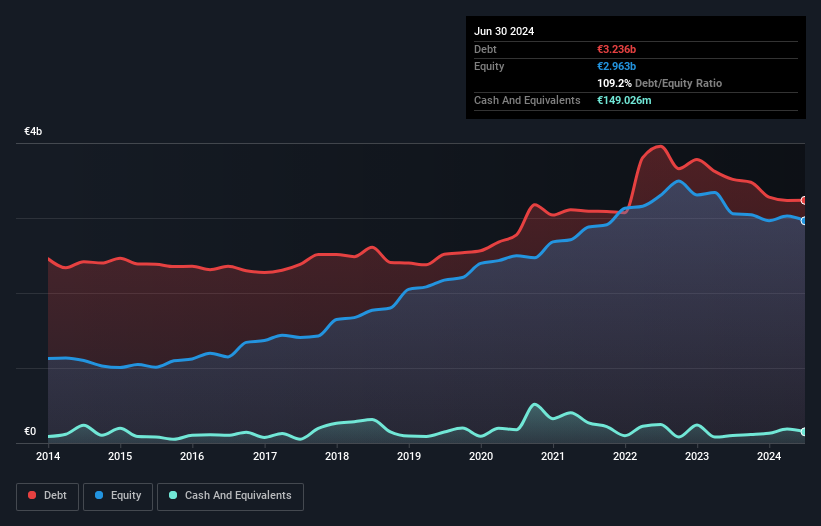David Iben put it well when he said, 'Volatility is not a risk we care about. What we care about is avoiding the permanent loss of capital.' So it might be obvious that you need to consider debt, when you think about how risky any given stock is, because too much debt can sink a company. Importantly, TAG Immobilien AG (ETR:TEG) does carry debt. But should shareholders be worried about its use of debt?
When Is Debt A Problem?
Generally speaking, debt only becomes a real problem when a company can't easily pay it off, either by raising capital or with its own cash flow. Part and parcel of capitalism is the process of 'creative destruction' where failed businesses are mercilessly liquidated by their bankers. However, a more frequent (but still costly) occurrence is where a company must issue shares at bargain-basement prices, permanently diluting shareholders, just to shore up its balance sheet. Of course, debt can be an important tool in businesses, particularly capital heavy businesses. The first step when considering a company's debt levels is to consider its cash and debt together.
View our latest analysis for TAG Immobilien
How Much Debt Does TAG Immobilien Carry?
As you can see below, TAG Immobilien had €3.24b of debt at June 2024, down from €3.51b a year prior. However, because it has a cash reserve of €149.0m, its net debt is less, at about €3.09b.

How Strong Is TAG Immobilien's Balance Sheet?
Zooming in on the latest balance sheet data, we can see that TAG Immobilien had liabilities of €1.38b due within 12 months and liabilities of €2.90b due beyond that. Offsetting this, it had €149.0m in cash and €43.8m in receivables that were due within 12 months. So its liabilities outweigh the sum of its cash and (near-term) receivables by €4.09b.
This deficit casts a shadow over the €2.72b company, like a colossus towering over mere mortals. So we'd watch its balance sheet closely, without a doubt. After all, TAG Immobilien would likely require a major re-capitalisation if it had to pay its creditors today.
We use two main ratios to inform us about debt levels relative to earnings. The first is net debt divided by earnings before interest, tax, depreciation, and amortization (EBITDA), while the second is how many times its earnings before interest and tax (EBIT) covers its interest expense (or its interest cover, for short). The advantage of this approach is that we take into account both the absolute quantum of debt (with net debt to EBITDA) and the actual interest expenses associated with that debt (with its interest cover ratio).
TAG Immobilien has a rather high debt to EBITDA ratio of 9.9 which suggests a meaningful debt load. However, its interest coverage of 6.1 is reasonably strong, which is a good sign. One way TAG Immobilien could vanquish its debt would be if it stops borrowing more but continues to grow EBIT at around 17%, as it did over the last year. There's no doubt that we learn most about debt from the balance sheet. But ultimately the future profitability of the business will decide if TAG Immobilien can strengthen its balance sheet over time. So if you want to see what the professionals think, you might find this free report on analyst profit forecasts to be interesting.
Finally, a business needs free cash flow to pay off debt; accounting profits just don't cut it. So we always check how much of that EBIT is translated into free cash flow. During the last three years, TAG Immobilien produced sturdy free cash flow equating to 77% of its EBIT, about what we'd expect. This cold hard cash means it can reduce its debt when it wants to.
Our View
While TAG Immobilien's level of total liabilities makes us cautious about it, its track record of managing its debt, based on its EBITDA, is no better. But on the brighter side of life, its conversion of EBIT to free cash flow leaves us feeling more frolicsome. When we consider all the factors discussed, it seems to us that TAG Immobilien is taking some risks with its use of debt. So while that leverage does boost returns on equity, we wouldn't really want to see it increase from here. There's no doubt that we learn most about debt from the balance sheet. However, not all investment risk resides within the balance sheet - far from it. Case in point: We've spotted 1 warning sign for TAG Immobilien you should be aware of.
At the end of the day, it's often better to focus on companies that are free from net debt. You can access our special list of such companies (all with a track record of profit growth). It's free.
Valuation is complex, but we're here to simplify it.
Discover if TAG Immobilien might be undervalued or overvalued with our detailed analysis, featuring fair value estimates, potential risks, dividends, insider trades, and its financial condition.
Access Free AnalysisHave feedback on this article? Concerned about the content? Get in touch with us directly. Alternatively, email editorial-team (at) simplywallst.com.
This article by Simply Wall St is general in nature. We provide commentary based on historical data and analyst forecasts only using an unbiased methodology and our articles are not intended to be financial advice. It does not constitute a recommendation to buy or sell any stock, and does not take account of your objectives, or your financial situation. We aim to bring you long-term focused analysis driven by fundamental data. Note that our analysis may not factor in the latest price-sensitive company announcements or qualitative material. Simply Wall St has no position in any stocks mentioned.
About XTRA:TEG
TAG Immobilien
A real estate company, engages in the acquisition, development, and management of residential real estate properties in Germany.
Fair value with mediocre balance sheet.
Similar Companies
Market Insights
Community Narratives



